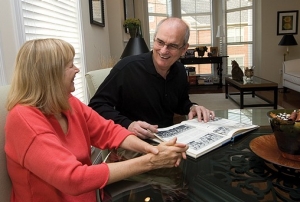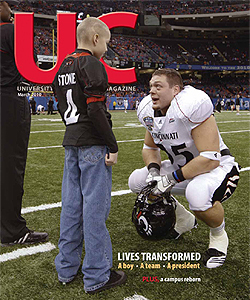Writing memoir was life-changing for University of Cincinnati President Gregory Williams
"My survival depended on my ability to conceal my emotions; I sought to reveal nothing about how I felt," President Gregory Williams explains in his book. "In fact, I struggled not to feel anything too deeply."
Those suppression tactics might have been necessary for a young boy enduring oppression, but they don't work on paper. Novelists have to spill their guts. Which meant Williams had to find his guts to begin with.
The job was more time consuming and painful than he or his wife, Sara, ever expected. "We were both quite naive about what writing a book meant," she says.
He cranked out his first draft rather quickly, but colleague editors pointed out that he was absent from the manuscript. "I had written it in the third person," he concedes. "To a large extent, that's how I survived Indiana, by stepping outside myself."
During the course of multiple rewrites, he had an editor who kept insisting that he "go deeper," Ms. Williams recalls. "He was finally writing in the first person, but he hadn't been able to tell the brutal truth.

Photo/Lisa Ventre
When Greg Williams and Sara Whitney grew interested in seeing each other in high school, they couldn't because of racial issues. At least not in public. Sara would pick him up in her family's car, where they would simply talk somewhere. Eventually, her parents received anonymous phone calls about the ''dates'' and tried to stop them. By the time wedding plans were made years later, Greg had won them over. ''They adored him,'' she says.
"She kept asking for more. She was almost like a therapist. I think he wanted to sock her a few times," Ms. Williams says, only half joking.
Over the next few years, he would travel back to Muncie to relive incidents that he had hoped to keep at a safe distance. He took writing workshops with Sara, and they critiqued each other's work.
"It was the most difficult thing he had ever done," she says. "It was so painful, but that is what it took to really tell the story from the heart, which is why so many people relate to it regardless of their background.
"I must say that living with him was a bit difficult during that time, but the perk -- besides having produced a wonderful book -- was that it relieved him of such a heavy burden. It changed his personality. He regained a normalcy and his sense of humor."
During the 10 years he spent working on the project, Williams frequently felt that the book would change his life. In some respects, it did, including the fact that its success made him a much more public figure.
Photographs in his sixth-floor office of University Pavilion show him with President Bill Clinton, former U.S. Secretary of State Colin Powell, Holocaust survivor and author Elie Wiesel, as well as actors James Earl Jones and Robert Duvall. Ms. Williams recalls the night the phone rang and the voice on the other end said, "This is Bobbie Duvall. Can I speak to Greg Williams?"
Duvall was working on the 1996 film "A Family Thing," in which he discovers that James Earl Jones is his half brother. He asked a few questions of Williams, then invited him to the movie set, where the photo was taken.
"Once you write a book like this, it takes on a life of its own," President Williams says. "You just kind of roll with it. It's allowed me to be in forums that I never would have been in."
He is particularly pleased that the book is required reading at a number of colleges, where it has had a powerful impact on some students. He recalls talking to students who had read the book as part of an English class at Ohio State University when Williams was dean of the law school.
A young white man from the Appalachian Mountains had subsequently written an essay in which he explained that on the first day of classes at OSU he had to leave early to travel back home and sign his father into an alcohol rehab program. The incident was too humiliating to share with anyone, he wrote, but reading the book changed his mind.
"If the dean of the law school can write about carrying his dad home on his shoulders because he's drunk," he wrote in the essay, "then I can talk about taking my dad to the rehab center."
When fans of the book meet Williams for the first time, they usually feel like they already know him. Of course, they only know a small part of his story.
The book does not tell how he sat in a law class and suddenly realized one day that he really wanted to be that professor in the front of the classroom rather than a lawyer. And the memoir stops short of explaining how working as a full-time high school teacher while attending law school left him with mediocre grades, for which he compensated by earning both a JD and a PhD.
"Everybody wants to know how I did it. How did I get to be a university president or dean? My wife likes to call it 'building it brick by brick.'
Gregory and Sara Williams have four children: Natalia, 37; Zachary, 35; and twins Anthony and Carlos, 25. The twins were adopted from Honduras after Ms. Williams spent several summers working at an orphanage there, where she fell in love with the cute preschoolers.
Explaining to her husband that she wanted to adopt them, of course, wasn't easy. "He said, 'Forget about it,'" she recalls. "But I couldn't. So I said, 'I'll let it go, if you visit them.'"
We went down, and the boys latched on and started calling him 'Popi.' There was no hope for him after that."
"There's no easy answer. You have to keep building. You have to keep your goals clear and stay focused.
"There was never any guarantee that I was going to reach those goals, but I am a guy that once I have my goals, I figure out how to get there."
Related articles:
Campus reviewers call book 'brave', 'hopeful'
New president penned best-seller
Link:
More articles and videos about UC President Gregory Williams

 Issue Archive
Issue Archive